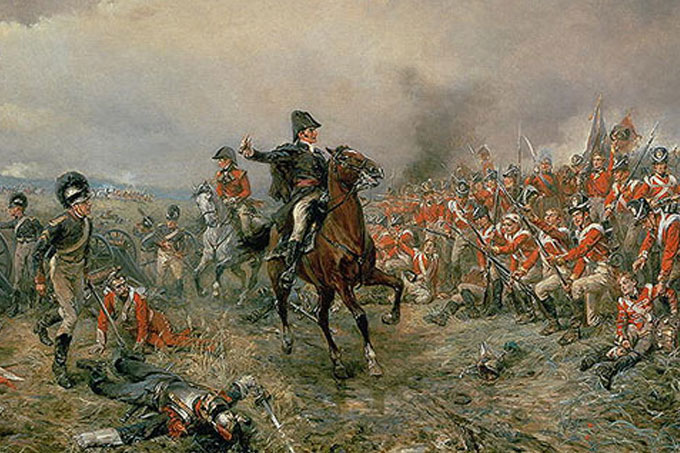On June 18 1815, British and French armies clashed for a final time in a muddy field in Belgium. The defeat of Napoleon, by the Duke of Wellington at the battle of Waterloo, would bring to an end over a decade of conflict between the warring countries and make the victor a legendary military hero.
However, with the vantage point of 200 years, Dr Keith McLay, Dean of the Faculty of Arts and Humanities, and an early modern military historian, believes that Wellington’s victory, if considered within the context of the Hundred Days campaign, shows him to be merely a competent general, and not exceptional as history has characterised him.
Dr McLay explained: “The popular consensus – largely based upon the success at Waterloo and the final defeat of Napoleon – lauds Wellington’s generalship as determined, strategic and tactically astute and, most importantly, the saviour of ‘Europe’ from the scourge of Napoleon (given that he had escaped from exile and conducted prior to Waterloo a broadly successful ‘Hundred Days’ campaign). However, this is a blunt assessment of the battle and the broader military history context. To really understand and asses the strategy and tactics used by Wellington, we must reinterpret Waterloo within the context of the Hundred Days campaign.
“Napoleon Bonaparte’s escape from exile on the Mediterranean island of Elba in March 1815 initiated the Hundred Days campaign which would culminate on 18 June at the battle of Waterloo.
“On that Brussels battlefield 200 years ago, Napoleon, considered by many historians as the finest general of his generation if not of the age, was defeated by the British commander, ‘Iron Duke’, Arthur Wellesley, 1st Duke of Wellington and Waterloo entered the annals of British martial successes.
“The historical reality was, however, more conventional. Wellington’s victory was narrow – in his own words, ‘the nearest run thing’ – and it occurred at the end of a campaign during which Napoleon had made the military weather, successfully pursuing a strategy to prevent the combination of Wellington’s Anglo-Dutch-German force with the army commanded by the Prussian General, Marshal Gerbhard von Blücher.
“Two days prior to Waterloo, Napoleon defeated Blücher at Ligny, while Wellington was able to extract his men successfully from Quatre Bras and fall back to Waterloo only because the French cavalry commander, Marshal Ney, hesitated on deployment.
“Success was only assured for Wellington when Blücher made good on his promise to re-join the battle, with his army entering from the east of the battlefield on to Napoleon’s right flank. Wellington’s strategic (the wider Hundred Days campaign) and tactical (the conduct of the battle of Waterloo) command was competent, not brilliantly conceived as historical writers have us believe.”
Dr Keith McLay will be speaking at the Kent and Canterbury Club on June 18, to commemorate the 200 anniversary of the battle of Waterloo.
 Expert comment
Expert comment holly finch
holly finch 1775
1775


